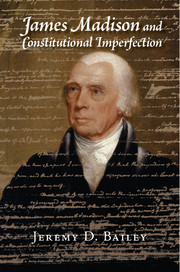Book contents
- Frontmatter
- Dedication
- Contents
- Preface
- Acknowledgments
- Abbreviations
- 1 The Madison Problem
- 2 Appeals to Tradition: The Case for and against Veneration
- 3 Appeals to Elites: The Problem with Deliberation
- 4 Public Opinion before Parties
- 5 The Turn to Public Opinion
- 6 Appeals to the People: Madison and the Revolution of 1800
- 7 Appeals to Text and History
- 8 “Take care of me when dead”
- Index
5 - The Turn to Public Opinion
Published online by Cambridge University Press: 05 November 2015
- Frontmatter
- Dedication
- Contents
- Preface
- Acknowledgments
- Abbreviations
- 1 The Madison Problem
- 2 Appeals to Tradition: The Case for and against Veneration
- 3 Appeals to Elites: The Problem with Deliberation
- 4 Public Opinion before Parties
- 5 The Turn to Public Opinion
- 6 Appeals to the People: Madison and the Revolution of 1800
- 7 Appeals to Text and History
- 8 “Take care of me when dead”
- Index
Summary
“How devoutly it is to be wished, then, that the public opinion of the United States should be enlightened; that it should attach itself to their governments as delineated in the great charters, derived not from the usurped power of kings, but from the legitimate authority of the people; and that it should guarantee, with a holy zeal, these political scriptures from every attempt to add to or diminish from them.”
– James MadisonEven if Madison failed in giving the United States the constitution he thought best, he succeeded in terms of getting a better constitution proposed, ratified, inaugurated, and then safely amended. This was a tremendous accomplishment, and it required that Madison refuse to compromise on the essential features of what a constitution is, but it also required that he compromise on others that were essential to getting any constitution at all. This forced him to encounter not only the enduring and necessary imperfection of any constitution but also the unnecessary and contingent imperfections of the constitution that he got. During his first year in Congress, Madison was able to dominate the politics that emerged at the intersection of these two kinds of imperfections, at least with respect to the debate on the removal power and the Bill of Rights. But he was not so successful in the succeeding debates, and he lost on key policy questions such as the assumption of war debts, the national bank, and U.S. neutrality in relations with France and England.
Rather than accepting these losses as the necessary consequence of deliberation, or as settled by the compromise and consensus required to survive the separation of powers, Madison instead chose the extra-constitutional path of organized opposition. This choice was not inevitable, and it was perhaps the most critical event of the decade. It was a choice that probably cannot be understood without placing it in the context of Thomas Jefferson, whose return from France somehow happened at about the same moment of Madison's turn to parties.
- Type
- Chapter
- Information
- James Madison and Constitutional Imperfection , pp. 89 - 113Publisher: Cambridge University PressPrint publication year: 2015



